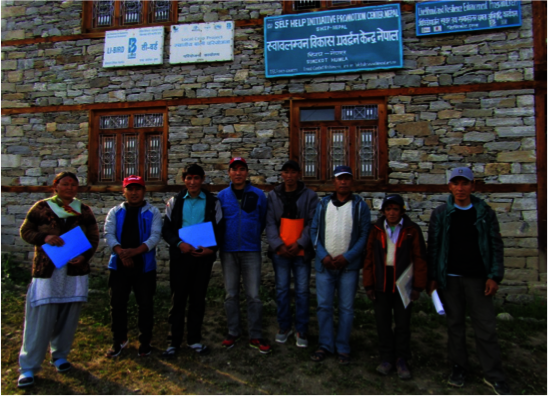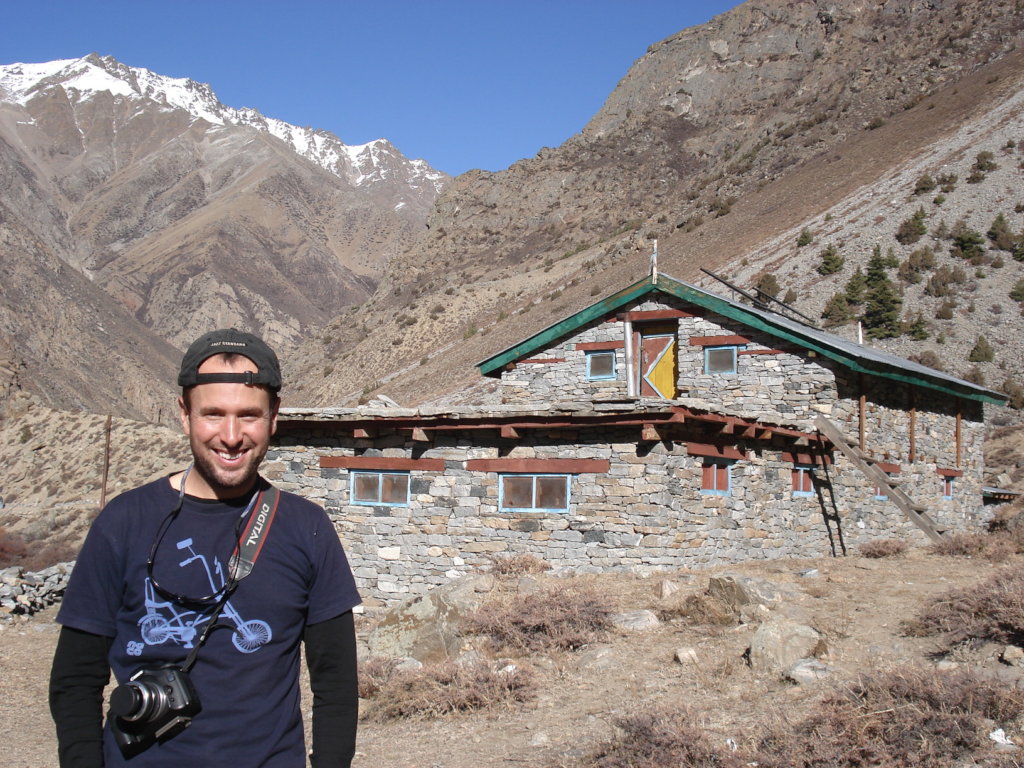![Happy children.]()
Happy children.
Dear Friends and Supporters.
As an INGO the Nepal Trust has strict Nepal government rules and regulations to follow. While sometimes feeling a bit bureaucratic it is sensible to ensure a coordinated approach that meets the needs of the country. The problems of such an ethnically diverse country spread over some of the most difficult terrain are immense. Remoteness is one and the ‘Hidden Himalayas” is typical with no roads or basic infrastructures to help services meet local needs.
The Nepal Trust has just completed a 5year project cycle, and is about to start a new one. Before the old Project Agreement (PA) can be signed off, and a new one agreed, the government must conduct a Final Evaluation Report for submission to the Social Welfare Council (SWC). This has now been completed and accepted by the SWC with excellent results from our point of view.
The following is a summary of its major findings.
Overall, projects run by the Nepal Trust are found to be done very effectively and according to the approved project agreement and surveys.
- ‘Community Health/Education, Sanitation and Livelihood Development project’ comprised various sectors including livelihood support for sustainable development, health, sanitation, education and livelihood
- Constructed 8 Health Posts and Birthing Centres that have benefitted 31557 people.
- Constructed school infrastructures including main buildings, retaining walls, fencing, toilets, canteens, classrooms, furniture, school equipment and drinking water at 3 schools.
- Project donor funds have been utilized properly whereby all tax regulations have been followed.
- Internal management is good and the overall effectiveness of the project is very satisfactory.
Effectiveness
The project has achieved its targets, and appears to have exceeded overall targets that were set before launching the project. The project has focussed on community development programmes mentioned in the project agreement.
Efficiency
The project interventions are low cost particularly in light of logistical constraints and the remoteness of the area, tangible benefits received by the beneficiaries in terms of increased education, sanitation, energy, development and health of the targeted communities as well as sustainable development. Considering the low cost for administration and project support it seems the Nepal Trust INGO has reached many beneficiaries through its projects. This also became very clear by the positive responses from government officials who supported the fact that activities had been implemented at low cost and had achieved good results.
Coordination and Coherence.
While implementing the ‘Community Health/Education, Sanitation and Livelihood Development Project’ coordination took place with the partner NGO, the communities and local authorities. Every year 2 meetings were conducted with the District Project Advisory Committee (DPAC) as well as various meetings with school management committees, health management committees, teacher/parent associations, local communities, electricity committees, tourism committees, journalists, political parties, government bodies, etc.
Sustainibility.
The Nepal Trust involves local communities in its projects and encourages them to obtain local funding as part of their contribution. This ensures ownership of projects and motivation within communities to maintain their own assets and take care of projects that will ensure sustainability. Projects are handed over to existing community and user committees or those that are set up for the purpose. The Nepal Trust also facilitates communities in local grant writing, subsidy attainment, and creates linkages to local agencies and government bodies to achieve better local cooperation amongst stakeholders for the long-term. The Trust also works with more business like principles to get the best value for money in its projects and as there is a long-term commitment and plan to extend activities and work more closely with the government system so, therefore, the sustainability of this project is very good. Besides this there are some issues also. The evaluation team asked various beneficiaries about the project sustainability. According to the stakeholders there is not enough coordination between the local levels and related education offices about long-term support for the sustainability of the project. However, people hope that the programme will continue for many years to come to help them in their development for which people are willing to take an active and pro-active role in order to achieve this. Through active participation and, by linking to the government system, communities will be better enabled to sustain their projects in future themselves.
Transparency
For all project activities the respective beneficiaries were informed of project cost to serve the transparency issues. Social audits were conducted on site by local staff management.
Opportunity
This project has been implemented in a very remote and impoverished part of Nepal’s Himalayas. The project has an opportunity to bring much needed change in Humla district.
Strength
The project is benefitting deprived communities and addresses the problems faced by the mountain people by integrating education, energy, health and livelihood support in a great manner.
Threat
The project runs in a very remote area where logistic constraints create problems at times for project implementation. There is no road connectivity and often electricity and communication facilities are lacking. Also villages are sometimes located many days walk away from each other and are very much scattered throughout the area.. Weather issues form another challenge. All these factors contribute to higher project costs and make it more difficult to manage projects by local staff.
Weakness
The logistical constraints and weather issues in the project area can create challenges for successful project implementation.
Conclusions
The Nepal Trust has exercised vigorously to improve the basic health and education of Humli people. It has constructed health facilities and supported basic medicines and medical equipment to many health posts. Moreover, the credit of school construction to make easy access to primary education for the people of Thehe VDC goes to this organisation. The Trust has played a crucial role to support the health and education sectors in helping to reduce the morbidity and mortality rates. Since the project aims to continue in future years more targeted output can be achieved. The overall performance and financial management of the Trust was found sound and in accordance with Nepal government financial rules and regulations. The financial statement was properly drawn up according to the general accounting principles. Internal control mechanisms were conducted in a sound manner. All the financial transactions and activities were in compliance with the general project agreement and tax laws.
Internal auditing practice is applied. It helped to prepare accounts and to provide a true and fair procurement of goods. Tax is deposited directly to the Inland Revenue office within the time specified by the income tax act of 2058. Quotations, in writing, are collected from potential suppliers by the partner NGO. Overall effectiveness of the project is high considering the value for money achieved and by taking into account the difficult circumstances the organisation is working in. Overall performance of projects run by the Nepal Trust is found to be good and they have reached a significant number of beneficiaries and obtained the required project output. With the analysis and project visit made so far overall financial performance of the project is very satisfactory. Since the project is completed and aims to continue in future years, the targeted output has been achieved and can be increased in years to come. The overall performance and financial management of the Trust was found effective. The internal control mechanism was very good and solid and donors can be assured that project funds are spent properly.
This audit report is an excellent independent commendation of our work under some very difficult logistical circumstances. The next 5year plan has been approved and will be reported on in future reports. In summary we will be carrying out the following projects under our ‘Health and Opportunity’ umbrella.
- We will build 3 new health clinics/birthing centres in south Humla, an area not yet well served by the current system. The clinics will be to approved government design under the control of the District Health Officer (DHO) at Maspur, Tumcha, and Piplang and will serve a population of 12500 people.
- We will continue to support 4 existing clinics and 3 birthing centres.
- We will deliver 4 Little Doctors training courses per annum at Secondary schools in Simikot, Sarkegad, Thehe and Bargaun.
- In collaboration with the DHO we will deliver, each year, maternal health training in Yari, Bargaun and Sarkegad.
- We will continue to promote and develop renewable energy projects in the district through our innovative Renewable Energy Service centre.
To all our donors and supporters I would like to thank you for your support and I hope that the results make you happy and satisfied that your donations have not been wasted. I hope you will continue to help in whatever way you can and please tell your friends. Pass on the good news.
Namaste
![Life can be hard.]()
Life can be hard.
![Travelling between villages]()
Travelling between villages
![A class of Little Doctors]()
A class of Little Doctors
![Health worker.]()
Health worker.
![The Renewable Energy Service Centre]()
The Renewable Energy Service Centre
![Share on Twitter]()
![Share on Facebook]()

